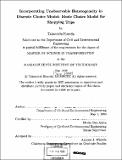Incorporating unobservable heterogeneity in discrete choice model : mode choice model for shopping trips
Author(s)
Hosoda, Takamichi, 1965-
DownloadFull printable version (4.277Mb)
Other Contributors
Massachusetts Institute of Technology. Dept. of Civil and Environmental Engineering.
Advisor
Moshe Ben-Akiva.
Terms of use
Metadata
Show full item recordAbstract
In this thesis, we propose a methodology for incorporating attitudinal data in a choice model to capture unobservable heterogeneity across the population. The key features of this approach are, 1) the concept of latent attitudes, and the assumption that 2) the respondent's answers to psychometric attitudinal questions relating to the importance of attributes are manifestations of these attitudes and that 3) those attitudinal data bring sufficient information to capture unobservable heterogeneity across the population in the context of choice behavior. Each individual is probabilistically assigned to a finite number of segments according to his/her own value of latent attitudinal variable(s) as well as to threshold parameter(s) common to the population. Segment-specific parameters are estimated simultaneously. An empirical case study on shopping trip mode choice demonstrates the effectiveness of the methodology.
Description
Thesis (S.M.)--Massachusetts Institute of Technology, Dept. of Civil and Environmental Engineering, 1999. Includes bibliographical references (leaves 90-95).
Date issued
1999Department
Massachusetts Institute of Technology. Department of Civil and Environmental EngineeringPublisher
Massachusetts Institute of Technology
Keywords
Civil and Environmental Engineering.